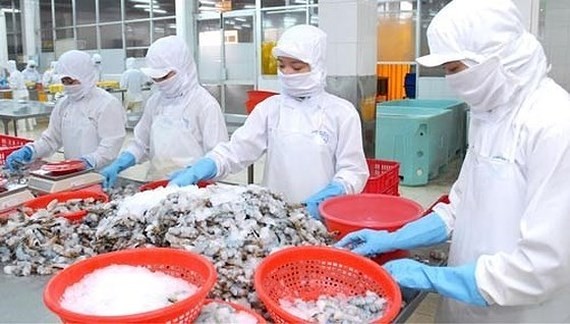
Minister of the Ministry of Agriculture and Rural Development Nguyen Xuan Cuong said that from 2018 to now, the number of enterprises investing in agriculture has tripled that in the year before last. In July this year alone, there were 1,100 newly-established enterprises in agro-forestry-aquatic sector. By exporting agricultural products to 180 countries and territories, Vietnam ranked 15th among countries with highest agricultural export turnover in the world. Vietnamese enterprises have been encountering barriers and difficulties when investing in this sector. Fortunately, these barriers can be completely tackled.
Sharing the same opinion, Mr. Do Ha Nam, vice chairman of the Vietnam Food Association, said that if investing in intensive processing of agricultural, aquatic and seafood products, enterprises can both increase value of export products and reduce risks from food safety and disease control barriers. Many enterprises said that restrictions in internal investment capacity to raise the ratio of intensive processing have been making Vietnamese agricultural products unable to get the best out of advantages created by the EVFTA. It is estimated that in order to invest in intensive processing, enterprises must have investment capital from tens of millions dollars to hundreds of millions dollars.
Survey by the Vietnam Chamber of Commerce and Industry showed that among 2,200 enterprises invested in the sector last year, the majority was small and extremely-small sized ones with around 10 to 20 employees per enterprise. Their technology of processing, packing and new product researching remained limited.
Ms. Pham Thi Hong Hanh, head of the International Cooperation Department under the Ministry of Agriculture and Rural Development, said that right after the EVFTA is passed, most of agricultural, aquatic and seafood products of Vietnam to the European market receive a preferential import tariff of zero percent. However, as still relying on raw materials export, agricultural products of Vietnam will possibly face several technical barriers from various markets, the most common is the rules of origin.
The imposition of anti-dumping tariffs on China, South Korea, Taiwan and India by the EU and the US has urged enterprises from these countries and territories to move some low value-added production steps to Vietnam to get the Vietnamese origin. Therefore, agricultural, aquatic and seafood products of Vietnam might be applied trade remedies due to origin frauds. In fact, by July this year, 20 groups of Vietnamese export products had been investigated by importing countries for tax evasion, including aluminum, steel, seafood, plywood, fiber, household appliances and solar batteries.
On the other hand, according to the scheme, after 3 to 5 years since the EVFTA is signed, Vietnam also has to open domestic market and impose preferential import duty of zero percent for European enterprises which produce dairy products and frozen cattle and poultry meat. With large-scale production and high-quality products, these foreign enterprises will compete fiercely with Vietnamese ones.
Ms. Nguyen Thi Thu Sac, vice chairwoman of the Vietnam Association of Seafood Exporters and Producers, said that the Ministry of Agriculture and Rural Development needs to make plans to popularize and update full and detailed information and solutions for domestic enterprises to make the most of export advantages from free trade agreements in general and the EVFTA in particular. As for some product groups enjoying preferential import duties under certain quotas, there should be priority for domestic firms. At the same time, it is essential to recheck export turnover of each product group, as well as tighten control on foreign investment attraction so as to prevent firms from investing a low value-added production step in Vietnam only to take advantage of the rules of origin. The consequences are that when importing markets investigate, uncover and impose trade remedies, domestic manufacturing industry will suffer serious damages.
Mr. Dau Anh Tuan, general director of the Legal Department of VCCI, emphasized that authorities should promote resolving shortcomings in administrative procedure relating to land and create conditions to establish raw material areas with large scale production and high technology application which ensure that the process of cultivation meet global standards so as to actively supply raw materials for firms. At the same time, they should make policies to protect assets of enterprises investing in agriculture.
Minister of Industry and Trade Tran Tuan Anh said that the ministry has been step up supporting of market information and export advantages for enterprises. The ministry worked with authorities to tighten control on issuance of certificates of origin as well as strictly control when there are suspicions of commercial frauds, especially on those which are being investigated, including aluminum, steel, plywood and shrimps. Authorities have also been also rechecking polices to attract foreign investment.
Minister of Agriculture and Rural Development Nguyen Xuan Cuong said that the ministry has been cooperated with provinces to develop product value chain and raw material area and build international distribution chain and brand chain. The country currently has nearly 1,500 supply chains of safe food. In the near future, the ministry will collaborate with provinces to help with investment in high-tech stages. Especially, it will soon establish customer database to timely adjust export policies to match with market demand.
























